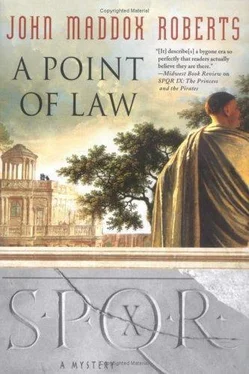John Roberts - A Point of Law
Здесь есть возможность читать онлайн «John Roberts - A Point of Law» весь текст электронной книги совершенно бесплатно (целиком полную версию без сокращений). В некоторых случаях можно слушать аудио, скачать через торрент в формате fb2 и присутствует краткое содержание. Год выпуска: 0101, ISBN: 0101, Издательство: St. Martin, Жанр: Исторический детектив, на английском языке. Описание произведения, (предисловие) а так же отзывы посетителей доступны на портале библиотеки ЛибКат.
- Название:A Point of Law
- Автор:
- Издательство:St. Martin
- Жанр:
- Год:0101
- ISBN:9780312337254
- Рейтинг книги:5 / 5. Голосов: 1
-
Избранное:Добавить в избранное
- Отзывы:
-
Ваша оценка:
- 100
- 1
- 2
- 3
- 4
- 5
A Point of Law: краткое содержание, описание и аннотация
Предлагаем к чтению аннотацию, описание, краткое содержание или предисловие (зависит от того, что написал сам автор книги «A Point of Law»). Если вы не нашли необходимую информацию о книге — напишите в комментариях, мы постараемся отыскать её.
A Point of Law — читать онлайн бесплатно полную книгу (весь текст) целиком
Ниже представлен текст книги, разбитый по страницам. Система сохранения места последней прочитанной страницы, позволяет с удобством читать онлайн бесплатно книгу «A Point of Law», без необходимости каждый раз заново искать на чём Вы остановились. Поставьте закладку, и сможете в любой момент перейти на страницу, на которой закончили чтение.
Интервал:
Закладка:
“You’re not haranguing the consilium plebis ,” I told him. “There is something in what you say, but there’s also great danger. The optimales often behave foolishly and selfishly, but so do the populares . Any degree of mismanagement is better than civil war, which is what we’ll have if it comes to a contest between the two. We’ve had too much of that already.”
“So we have,” he said reasonably. “Well, let’s hope it never comes to that.”
We drank to that fond wish, and I rose. “You two have funerary arrangements to attend to so I’ll trouble you no longer.”
“Let me know how your investigation goes,” Curio said. “I’ll speak up in the contio against your being charged with the murder.”
“I thank you for that. I suspect you’ll be hearing all about my findings. Fulvia, I thank you for your hospitality at such a difficult time.”
“Echo,” she called, “the senator is leaving. Decius Caecilius, please call again when you can spend more time.”
The shapely Greek saw me to the door, and I found Hermes standing outside. His eyes popped when he saw the housekeeper, and she smiled at him as she closed the door.
“Don’t go looking for likely prospects in that house,” I warned him.
He sighed. “They say the best-looking women in Rome live in that house.”
“I wouldn’t bet against it.”
“Did you get anything accomplished?” he asked me.
“I’ve just been talking politics.”
“With Fulvia? ”
We began to walk toward the Temple of Tellus, and Hermes wouldn’t tell me what he’d found out until he heard all about my visit.
“Why is this man Curio being so helpful?” Hermes wanted to know.
“He knows I’m in Caesar’s good graces and married to his niece. He’s Caesar’s man now, and he thinks that by siding with me in this odd case he’ll be driving me further into Caesar’s camp, which is the last place I want to be.”
It was not a long walk down the slope of the Palatine, across the Via Sacra, and up the slope of the Oppian Hill toward the temple. The Carinae district had some fine houses in it, and we stopped before one of the more modest of them. It was part of a three-story block, and looming above it could be seen the bronze roof of the temple.
Such buildings were the typical dwellings of Rome’s more prosperous inhabitants, those not wealthy enough to own their own homes but able to afford the rent on the better class of apartments.
The poor lived in towering, rickety insulae and endured a precarious, dangerous existence without amenities.
“Who owns it?” I asked.
“Claudius Marcellus.”
“The consul?”
“No, the one standing for next year’s consulship: Caius Claudius, not Marcus Claudius.”
“I never have any luck with that family,” I complained. “There are entirely too many of them around lately.”
“The building is divided into four large apartments, each having three floors. It doesn’t have separate, upper-floor apartments rented out to poor families. The ground floor has water piped in. There’s a central pool shared by all.” A fairly typical arrangement for such a dwelling.
“Prosperous merchants live in houses like this,” I said. “How did a penniless political adventurer like Fulvius afford it?”
“That’s your specialty,” Hermes said. “I just found out what I could about the place.”
“Who was your informant?”
He pointed to a barber who had his stool placed on a corner across from the house. The man was shaving a customer while another stood by waiting his turn. Barbers are among the best informants an investigator can have. They often occupy the same spot for many years, they shave most of the men in the neighborhood, they see everything that happens on the street, and they collect all the gossip.
I didn’t know a great deal about this particular Claudius Marcellus. He was only a distant relation of Clodius and his sisters, the Claudia Marcella having split off from the Claudia Pulchri back somewhere in the dim mists of antiquity. He was known in the Senate as one of the more virulent anti-Caesarians.
“Let’s have a look at the place,” I said.
We crossed the street and Hermes rapped on the door. Nobody answered. He gave it a push and it opened easily. He looked at me inquiringly, and I gestured for him to go in. I followed. Hermes vented a shrill whistle. Still no reply.
“Looks like nobody’s home,” he observed.
“That’s odd. In the Forum he seemed to be well-supplied with friends. Why aren’t any here, protecting his property? And where are his slaves?” Granted the man was poor, but he would have to be destitute indeed not to have at least a janitor to man the front door and a housekeeper. A bachelor can get along without a cook, relying on street vendors, taverns, and cadging meals. A valet is not absolutely necessary, although a would-be senator cuts a poor figure carrying his own books and papers, and hauling his own towel, oil flask, and scraper to the baths. Three to five household slaves were generally considered the absolute minimum for respectability. I got along for years with only two or three, but I also fell short of most other standards of respectability.
“Maybe he borrowed slaves as he needed them,” Hermes said, following my own line of thought. He had been with me so long we thought alike in these matters.
“Probably from the same man who must have let him have this place rent free,” I said. “Let’s look around.”
The place was not palatial, but it was better than the house I lived in when I began my political career. In truth Rome had few truly splendid houses in those days. Even the very wealthy men like Hortalus and Lucullus spent lavishly on their country villas but maintained fairly modest establishments in the City. Voters took it ill when a senator chose to live like a prince. In the City the rule was to spend freely on public works and stingily on yourself. Lucullus had made himself unpopular by building himself a pretentious mansion in the City after his Asian victories. He quickly demolished it and turned the grounds into a public garden, thus restoring his popularity with the plebs.
The triclinium was spacious, with excellent furnishings, as if Fulvius had expected to do a fair amount of entertaining there. The wall-paintings were fine and new, the subject matter patriotic rather than the more fashionable mythological themes. One wall featured the Oath of the Horatii , another the colorful story of Mucius Scaevola, a third was Cincinnatus at his plow. The fourth wall was pierced by the door so its decoration was floral.
“Odd decoration for a dining room,” Hermes observed. “Where are the feasting gods and goddesses and the satyrs chasing nymphs?”
“Perhaps Fulvius wanted to encourage serious dinner-table discussion,” I hazarded. “Nymphs and satyrs are frivolous. Just ask Cato.” Cato’s prudery was the butt of jokes wherever Romans met.
“If he has old patriots decorating his bedroom we’ll know there was something strange about the man,” Hermes observed.
“Actually I’m more interested in his papers than in his taste in interior decorating. Let’s see what he used for a study.”
Not every house had a study. Some men just kept their papers in a chest and did all their reading and writing in the peristyle or a garden. It was commonly thought that reading by any light other than direct sunlight would ruin your eyes. Some sought to further preserve their eyesight by having trained slaves read to them. Some kept secretaries to take dictation and never personally set hand to pen.
Fulvius, as it occurred, had used his bedroom for this purpose. One side of it opened onto a small balcony overlooking the street. This was a common arrangement in multistory houses such as this one. The ground floor contained the atrium, kitchen, and dining room, and opened onto the central garden. It was the public part of the house. The second floor held the family’s sleeping quarters, and the third floor was for storage and slaves’ quarters. The balcony was another feature common to such houses. It offered a quick escape in case of a fire. All Romans went in dread of fire, and those who lived in the towering insulae were the most fearful of all.
Читать дальшеИнтервал:
Закладка:
Похожие книги на «A Point of Law»
Представляем Вашему вниманию похожие книги на «A Point of Law» списком для выбора. Мы отобрали схожую по названию и смыслу литературу в надежде предоставить читателям больше вариантов отыскать новые, интересные, ещё непрочитанные произведения.
Обсуждение, отзывы о книге «A Point of Law» и просто собственные мнения читателей. Оставьте ваши комментарии, напишите, что Вы думаете о произведении, его смысле или главных героях. Укажите что конкретно понравилось, а что нет, и почему Вы так считаете.









